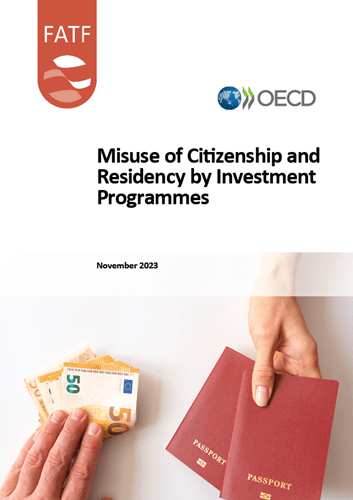
Misuse of Citizenship and Residency by Investment Programmes
23/11/2023
Citizenship and residency by investment (CBI/RBI) programmes are government-administered programmes that grant citizenship or residency to foreign investors by expediting or bypassing normal migration processes.
These programmes
- Can help spur economic growth through foreign direct investment.
- Are also attractive to criminals and corrupt officials seeking to evade justice and launder the proceeds of crime amounting to billions of dollars.
In response to the FATF Ministers’ call in April 2022 for greater focus on corruption, the FATF completed a joint project with the Organisation for Economic Co-operation and Development (OECD) that explores the money laundering and financial crime risks associated with CBI/RBI programmes, including risks related to
- Foreign bribery, fraud and corruption, and
- Their impact on public integrity, tax and migration.
FATF President T. Raja Kumar said.
- “Granting citizenship and residency to wealthy investors through 'golden' passport and visa programmes can potentially lead to economic growth. But they can and are being exploited by criminals and the corrupt, who want to launder their money, hide their identity and assets, or commit further crimes. This report calls on governments operating these programmes to implement various safeguards to ensure these programmes are administered risk-sensitively,”
OECD Secretary-General Cormann said.
- ”Criminal exploitation of citizenship and residency programmes is a multi-billion-dollar business to launder the proceeds of fraud and corruption, evade justice, or access third countries.
- Our joint FATF-OECD work identifies the risks and vulnerabilities around golden visa schemes and offers a series of mitigation measures to help policymakers and programme operators, including appropriate due diligence, transparency, and integrity mechanisms,”
Properly managed CBI or RBI programmes can benefit both host countries and individuals, but in practice, such programmes bring significant risks of money laundering, fraud, and other forms of misuse.

The report emphasises
- That the elevated risks of money laundering and financial crime in these investment migration programmes relate not only to the applicant but also to the professional enablers and intermediaries involved in the process. It is therefore essential to ensure clarity around the respective roles and responsibilities of the various parties involved in RBI/CBI programmes to be able to detect fraudulent activity.
The report highlights
- How CBI programmes can allow criminals more global mobility and help them hide their identity and criminal activities behind shell companies in other jurisdictions. It highlights the vulnerabilities of these complex and international investment migration programmes, including the frequent use of intermediaries, involvement of multiple government agencies, abuse by professional enablers and lack of proper governance of the CBI/RBI programmes.
The report proposes measures and cites examples of good practices that can help policymakers and those responsible for managing investment migration programmes to address these risks. These include
- An in-depth analysis and understanding of how criminals can exploit CBI or RBI programmes.
The report highlights how
- Governments can incorporate risk mitigation measures, such as multi-layered due diligence, in the design of their investment migration programmes.
The report emphasises
- That the elevated risks of money laundering and financial crime in these investment migration programmes relate not only to the applicant but also to the professional enablers and intermediaries involved in the process.
- It is therefore essential to ensure clarity around the respective roles and responsibilities of the various parties involved in RBI/CBI programmes to be able to detect fraudulent activity.
Source
https://www.fatf-gafi.org/en/publications/Methodsandtrends/misuse-CBI-RBI-programmes.html
The Team
Meet the team of industry experts behind Comsure
Find out moreLatest News
Keep up to date with the very latest news from Comsure
Find out moreGallery
View our latest imagery from our news and work
Find out moreContact
Think we can help you and your business? Chat to us today
Get In TouchNews Disclaimer
As well as owning and publishing Comsure's copyrighted works, Comsure wishes to use the copyright-protected works of others. To do so, Comsure is applying for exemptions in the UK copyright law. There are certain very specific situations where Comsure is permitted to do so without seeking permission from the owner. These exemptions are in the copyright sections of the Copyright, Designs and Patents Act 1988 (as amended)[www.gov.UK/government/publications/copyright-acts-and-related-laws]. Many situations allow for Comsure to apply for exemptions. These include 1] Non-commercial research and private study, 2] Criticism, review and reporting of current events, 3] the copying of works in any medium as long as the use is to illustrate a point. 4] no posting is for commercial purposes [payment]. (for a full list of exemptions, please read here www.gov.uk/guidance/exceptions-to-copyright]. Concerning the exceptions, Comsure will acknowledge the work of the source author by providing a link to the source material. Comsure claims no ownership of non-Comsure content. The non-Comsure articles posted on the Comsure website are deemed important, relevant, and newsworthy to a Comsure audience (e.g. regulated financial services and professional firms [DNFSBs]). Comsure does not wish to take any credit for the publication, and the publication can be read in full in its original form if you click the articles link that always accompanies the news item. Also, Comsure does not seek any payment for highlighting these important articles. If you want any article removed, Comsure will automatically do so on a reasonable request if you email info@comsuregroup.com.


